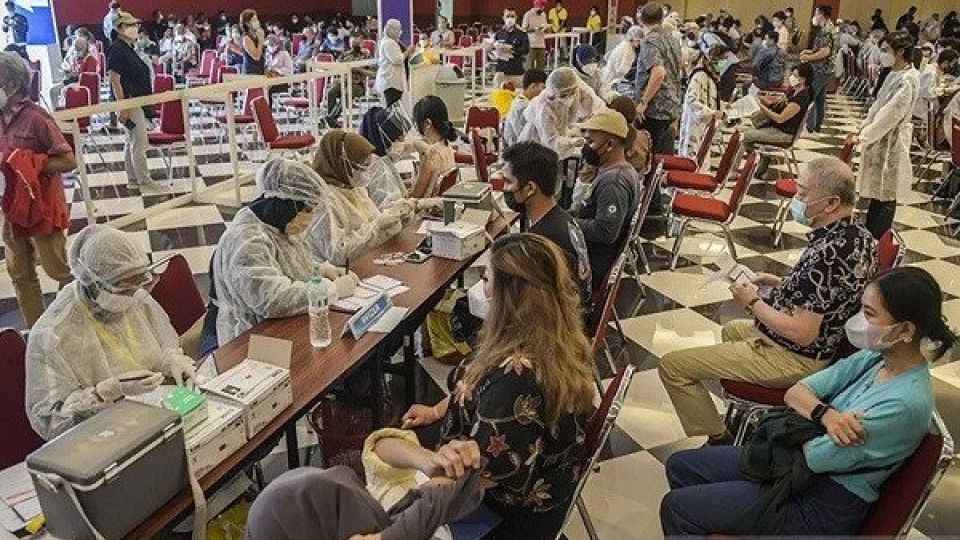January 9, 2023
JAKARTA – After lifting all remaining pandemic health restrictions at the end of last year, the government now plans to focus its attention and resources on transforming the country’s healthcare system.
Speaking at a press briefing on Thursday, Health Minister Budi Gunadi Sadikin said the country’s daily caseload over the past year had shown that foreign variants, which used to create significant problems for Indonesia’s pandemic handling, no longer posed a significant threat.
“While there have been new variants, such as the Omicron subvariants BA.4, BA.5, as well as BQ.1 and XBB, they did not create new case spikes. Other countries had spikes, but we did not see a significant ones, be it in terms of cases or deaths,” Budi said.
This, he claimed, was thanks to Indonesia’s inoculation drive. As of Thursday, Health Ministry records show, some 174 million people, or around 74 percent of the target population, were fully vaccinated, with 29 percent having received a booster shot and 5 percent having received a second.
Budi said the government was going to use the lessons learned from the COVID-19 crisis to transform the country’s health system.
The World Health Organization said in mid-December 2022 that it hoped COVID-19 would no longer be a public health emergency in 2023. It noted that the virus was here to stay but would need to be managed more routinely alongside other respiratory illnesses.
“We have come a long way,” WHO chief Tedros Adhanom Ghebreyesus said at the time.
However, Seth Berkley, chief of the Global Alliance for Vaccines and Immunization (GAVI), warned that it was too early to call an end to the COVID-19 emergency, saying the pandemic could still get worse.
“[The global situation] could conceivably get worse. It could get better. We don’t know where it’s going. It seems like a tough time to stop that emergency,” he said, as quoted by Reuters.
Promotion and prevention
Drawing comparisons with the 1998 financial crisis, Budi, formerly a banker, said, “ Indonesia has always succeeded in taking advantage of the new opportunities presented by a crisis to carry out large-scale transformations.
“That’s why, as per [President Joko ‘Jokowi’ Widodo’s] orders, we are doing a big [overhaul] of the health sector,” he said.
Efforts to transform Indonesia’s healthcare system began last year, with Budi penning a ministerial regulation in July that instructed regional administrations to follow a national healthcare transformation blueprint.
The blueprint covers six core aspects to be improved: primary healthcare services, referral services, healthcare system resilience, financing, human resources and technology.
“I think transforming primary health care to provide more promotive and preventive-oriented services is the most important,” Budi said. “We must ensure that our people understand how to live a healthy life and which precautions to take to stay healthy.”
The Health Ministry aims to expand and standardize the country’s thousands of integrated health services posts (Posyandu) and community health centers (Puskesmas) so that it can provide primary healthcare to all ages and conduct lab testing as well as screen for deadly illnesses, such as cancer, strokes and tuberculosis.
Budi also highlighted the country’s lack of hospitals and medical professionals, especially specialist doctors, as issues that would have to be addressed.
To this end, the Health Ministry plans to equip each of the country’s 514 regencies and cities with a hospital that can accommodate moderate-level surgical operations, such as heart stent operations or tumor removals, while each province will have its own advanced hospital.
The Health Ministry also aims to address the country’s lack of doctors by increasing the quota for medical students and lecturers, on top of providing more scholarship opportunities.
Digitizing health
Another aspect of the transformation, Budi said, would be the development of a “big-data” record keeping system, called Satu Sehat (one health), that would integrate patient health data across all health sectors.
“[I] issued a ministerial regulation at the end of [last year] for all hospitals, health centers, clinics and pharmacies to be connected to the Satu Sehat system. So if someone does a blood test in a lab, the next day, the results will be accessible through a citizen health app,” Budi said.
According to Budi, close to 3,000 health centers in Java and Bali, or around 70 percent of the total health centers there, and 370 hospitals on the two islands, or around 30 percent of the total, have been integrated into the Satu Sehat system.
The Health Ministry also plans to repurpose the PeduliLindungi application – the government’s COVID-19 tracing app – as a platform for citizens to access their own health data.
“Our experience with the pandemic has taught us that digitalization is very important for the health sector. This is also in line with President Jokowi’s vision of intensifying [the adoption] of an electronics-based government system,” Budi added.
In November 2022, private data from the PeduliLindungi app was allegedly hacked and put up for sale by pseudonymous hacker Bjorka.


